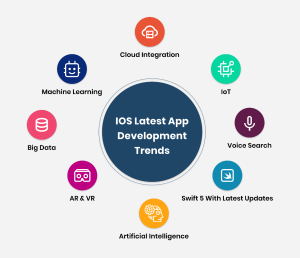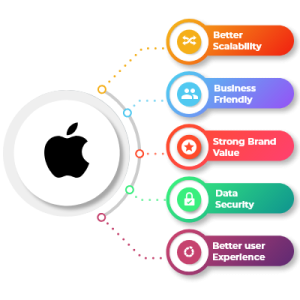 Exploring the World of iOS
Exploring the World of iOS
In the ever-evolving landscape of mobile technology, iOS stands as a frontrunner. Apple’s mobile operating system, known for its sleek design, performance, and security, powers millions of devices worldwide. In this comprehensive guide, we’ll delve into the world of iOS, its history, core features, app development, and the impact it has had on our digital lives.
Understanding iOS
iOS is Apple’s mobile operating system, originally developed for the iPhone but now extended to other devices like iPads, iPod Touches, and even the Apple Watch and Apple TV. It serves as the foundation for running applications (apps) and manages hardware resources, enabling users to interact with their devices seamlessly.
A Brief History of iOS
iOS has come a long way since its inception. Here’s a snapshot of its evolutionary journey:
- iOS 1: Launched in 2007, iOS 1 was revolutionary. It introduced features like the App Store, Safari web browser, and multi-touch gestures.
- iOS 4: This version, released in 2010, brought multitasking, folders for app organization, and FaceTime, Apple’s video calling service.
- iOS 7: In 2013, iOS underwent a major design overhaul with iOS 7. It introduced a flatter and more colorful interface, Control Center, and AirDrop.
- iOS 9: Released in 2015, iOS 9 focused on performance improvements, enhanced Siri capabilities, and introduced multitasking for iPads.
- iOS 11: This update, in 2017, brought the Files app, improved multitasking for iPads, and the ARKit for augmented reality apps.
- iOS 14: Introduced in 2020, iOS 14 featured home screen widgets, App Library, and App Clips for quick access to app functionality.
 Core Features of iOS
Core Features of iOS
- User Interface: iOS is known for its clean, intuitive, and user-friendly interface. Its design principles prioritize simplicity and clarity.
- App Store: The App Store is a vast marketplace for iOS apps, offering millions of apps for various purposes, from productivity to entertainment.
- Security: iOS is renowned for its security measures, including robust encryption, app sandboxing, and biometric authentication (Face ID and Touch ID).
- Siri: Apple’s virtual assistant, Siri, allows users to perform various tasks using voice commands, from setting reminders to checking the weather.
- iCloud: iCloud offers seamless synchronization of data across Apple devices, including photos, documents, and app data.
- Privacy: iOS places a strong emphasis on user privacy, giving users control over their data and app permissions.
iOS App Development
iOS app development is a thriving field, offering opportunities for developers to create innovative and user-centric applications. Here are key aspects of iOS app development:
- Programming Languages: iOS apps can be developed using Swift or Objective-C. Swift, introduced by Apple in 2014, has gained popularity for its simplicity and performance.
- Development Tools: Xcode is the primary Integrated Development Environment (IDE) for iOS app development. It includes a code editor, debugger, and interface builder.
- App Store Guidelines: Developers must adhere to Apple’s App Store guidelines, which cover app functionality, design, and security.
- Testing and Debugging: Testing is a crucial part of iOS app development. Developers use simulators and physical devices for testing, and Xcode provides robust debugging tools.
- User Interface Design: iOS apps should follow Apple’s Human Interface Guidelines (HIG) for a consistent and user-friendly design.
The Impact of iOS on Our Lives
iOS has transformed the way we live, work, and communicate. Here are some areas where iOS has left an indelible mark:
- Communication: iOS devices, with their iMessage and FaceTime capabilities, have revolutionized how we stay connected with friends and family across the globe.
- Productivity: iOS apps like Pages, Numbers, and Keynote have made mobile productivity a reality, allowing users to create, edit, and collaborate on documents.
- Entertainment: The App Store offers a vast selection of entertainment apps, from streaming services like Netflix to gaming apps like Pokémon GO.
- Health and Fitness: iOS devices come with health and fitness tracking features, encouraging users to lead healthier lives.
- Education: iOS has transformed education with interactive e-books, educational apps, and access to online courses and resources.
The Future of iOS
iOS continues to evolve, adapting to the changing needs of users and the advancements in technology. Some areas of focus for the future include:
- Augmented Reality (AR): iOS has embraced AR with ARKit, and we can expect more AR applications to enhance our daily lives.
- Machine Learning and AI: iOS devices are becoming smarter with machine learning and AI integration, improving personalization and user experiences.
- Privacy: Apple remains committed to user privacy, and future iOS updates will likely introduce even more robust privacy features.
- Cross-Platform Integration: We can anticipate further integration between iOS and macOS, allowing seamless interaction between Apple devices.
Conclusion
iOS has redefined the way we interact with technology. Its evolution from the early days of the iPhone to the latest iOS updates has consistently pushed the boundaries of what’s possible in the mobile world. Whether you’re a developer crafting the next innovative app or a user enjoying the vast ecosystem of iOS, this operating system continues to shape our digital lives in profound ways. As iOS continues to evolve, it remains an exciting platform that influences and enhances our daily experiences.

